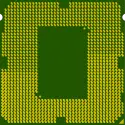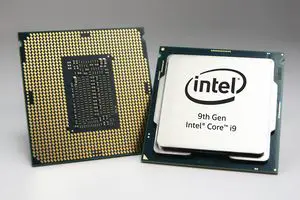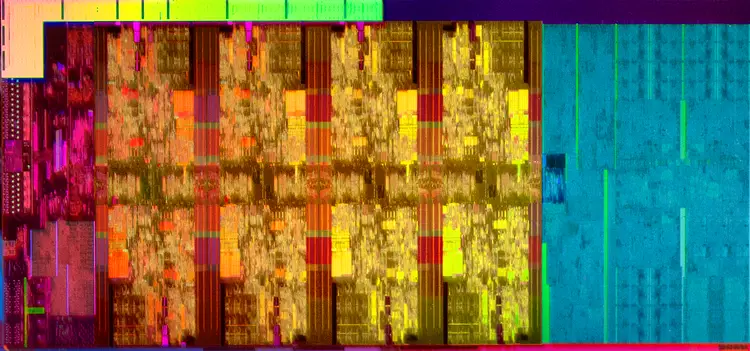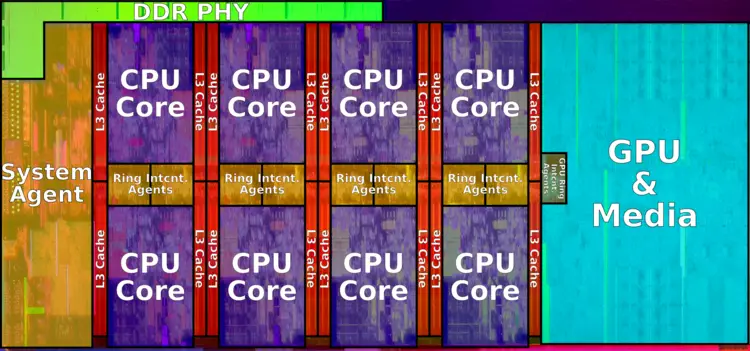From WikiChip
Difference between revisions of "intel/core i9/i9-9900kf"
(9900kf) |
(Corrected boost frequencies) |
||
| (9 intermediate revisions by 2 users not shown) | |||
| Line 6: | Line 6: | ||
|manufacturer=Intel | |manufacturer=Intel | ||
|model number=i9-9900KF | |model number=i9-9900KF | ||
| − | |part number=BX80684I99900KF | + | |part number=BXC80684I9990KF |
| + | |part number 2=BX80684I99900KF | ||
| + | |part number 3=CM8068403873927 | ||
| + | |s-spec=SRFAA | ||
|market=Desktop | |market=Desktop | ||
|first announced=January 7, 2019 | |first announced=January 7, 2019 | ||
|first launched=January 7, 2019 | |first launched=January 7, 2019 | ||
| + | |release price (tray)=$488.00 | ||
| + | |release price (box)=$499.00 | ||
|family=Core i9 | |family=Core i9 | ||
|series=i9-9000 | |series=i9-9000 | ||
|locked=No | |locked=No | ||
|frequency=3,600MHz | |frequency=3,600MHz | ||
| − | |turbo frequency2=5, | + | |turbo frequency1=5,000 MHz |
| + | |turbo frequency2=5,000 MHz | ||
| + | |turbo frequency3=4,800 MHz | ||
| + | |turbo frequency4=4,800 MHz | ||
| + | |turbo frequency5=4,700 MHz | ||
| + | |turbo frequency6=4,700 MHz | ||
| + | |turbo frequency7=4,700 MHz | ||
| + | |turbo frequency8=4,700 MHz | ||
|bus type=DMI 3.0 | |bus type=DMI 3.0 | ||
|bus links=4 | |bus links=4 | ||
| Line 32: | Line 44: | ||
|core count=8 | |core count=8 | ||
|thread count=16 | |thread count=16 | ||
| + | |max memory=128 GiB | ||
|max cpus=1 | |max cpus=1 | ||
| − | |||
|tdp=95 W | |tdp=95 W | ||
|tjunc min=0 °C | |tjunc min=0 °C | ||
| Line 42: | Line 54: | ||
}} | }} | ||
[[File:Intel-9th-Gen-Core-1.jpg|right|thumb|Core i9-9900K]] | [[File:Intel-9th-Gen-Core-1.jpg|right|thumb|Core i9-9900K]] | ||
| − | '''Core i9- | + | '''Core i9-9900KF''' is a {{arch|64}} [[octa-core]] high-end performance [[x86]] desktop microprocessor introduced by [[Intel]] in late [[2018]]. This processor, which is based on the {{intel|Coffee Lake|l=arch}} microarchitecture, is manufactured on Intel's 3rd generation enhanced [[14 nm process|14nm++ process]]. The i9-9900KF operates at a 3.6 GHz with a TDP of 95 W and a {{intel|Turbo Boost}} frequency of up to 5 GHz. This chip supports up to 128 GiB of dual-channel DDR4-2666 memory. |
This is model is identical to the {{\\|i9-9900K}} except it comes without integrated graphics. | This is model is identical to the {{\\|i9-9900K}} except it comes without integrated graphics. | ||
| Line 71: | Line 83: | ||
|type=DDR4-2666 | |type=DDR4-2666 | ||
|ecc=No | |ecc=No | ||
| − | |max mem= | + | |max mem=128 GiB |
|controllers=1 | |controllers=1 | ||
|channels=2 | |channels=2 | ||
| Line 126: | Line 138: | ||
|avx512vbmi=No | |avx512vbmi=No | ||
|avx5124fmaps=No | |avx5124fmaps=No | ||
| + | |avx512vnni=No | ||
|avx5124vnniw=No | |avx5124vnniw=No | ||
|avx512vpopcntdq=No | |avx512vpopcntdq=No | ||
| Line 141: | Line 154: | ||
|clmul=Yes | |clmul=Yes | ||
|f16c=Yes | |f16c=Yes | ||
| + | |bfloat16=No | ||
|tbt1=No | |tbt1=No | ||
|tbt2=Yes | |tbt2=Yes | ||
| Line 146: | Line 160: | ||
|bpt=No | |bpt=No | ||
|eist=Yes | |eist=Yes | ||
| − | |sst= | + | |sst=Yes |
|flex=No | |flex=No | ||
|fastmem=No | |fastmem=No | ||
| Line 159: | Line 173: | ||
|sba=No | |sba=No | ||
|mwt=No | |mwt=No | ||
| − | |sipp= | + | |sipp=No |
|att=No | |att=No | ||
|ipt=Yes | |ipt=Yes | ||
| − | |tsx= | + | |tsx=No |
| − | |txt= | + | |txt=No |
|ht=Yes | |ht=Yes | ||
| − | |vpro= | + | |vpro=No |
|vtx=Yes | |vtx=Yes | ||
|vtd=Yes | |vtd=Yes | ||
| Line 174: | Line 188: | ||
|osguard=Yes | |osguard=Yes | ||
|intqat=No | |intqat=No | ||
| + | |dlboost=No | ||
|3dnow=No | |3dnow=No | ||
|e3dnow=No | |e3dnow=No | ||
| Line 200: | Line 215: | ||
|freq_1=5,000 MHz | |freq_1=5,000 MHz | ||
|freq_2=5,000 MHz | |freq_2=5,000 MHz | ||
| − | |freq_3=4, | + | |freq_3=4,900 MHz |
|freq_4=4,800 MHz | |freq_4=4,800 MHz | ||
|freq_5=4,700 MHz | |freq_5=4,700 MHz | ||
Latest revision as of 09:36, 30 July 2024
| Edit Values | ||||||||||||
| Core i9-9900KF | ||||||||||||
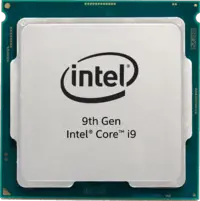 | ||||||||||||
| General Info | ||||||||||||
| Designer | Intel | |||||||||||
| Manufacturer | Intel | |||||||||||
| Model Number | i9-9900KF | |||||||||||
| Part Number | BXC80684I9990KF, BX80684I99900KF, CM8068403873927 | |||||||||||
| S-Spec | SRFAA | |||||||||||
| Market | Desktop | |||||||||||
| Introduction | January 7, 2019 (announced) January 7, 2019 (launched) | |||||||||||
| Release Price | $488.00 (tray) $499.00 (box) | |||||||||||
| Shop | Amazon | |||||||||||
| General Specs | ||||||||||||
| Family | Core i9 | |||||||||||
| Series | i9-9000 | |||||||||||
| Locked | No | |||||||||||
| Frequency | 3,600MHz | |||||||||||
| Turbo Frequency | 5,000 MHz (1 core), 5,000 MHz (2 cores), 4,800 MHz (3 cores), 4,800 MHz (4 cores), 4,700 MHz (5 cores), 4,700 MHz (6 cores), 4,700 MHz (7 cores), 4,700 MHz (8 cores) | |||||||||||
| Bus type | DMI 3.0 | |||||||||||
| Bus rate | 4 × 8 GT/s | |||||||||||
| Microarchitecture | ||||||||||||
| ISA | x86-64 (x86) | |||||||||||
| Microarchitecture | Coffee Lake | |||||||||||
| Platform | Coffee Lake | |||||||||||
| Chipset | 300 series | |||||||||||
| Core Name | Coffee Lake R | |||||||||||
| Core Family | 6 | |||||||||||
| Core Model | 158 | |||||||||||
| Core Stepping | P0 | |||||||||||
| Process | 14 nm | |||||||||||
| Technology | CMOS | |||||||||||
| Word Size | 64 bit | |||||||||||
| Cores | 8 | |||||||||||
| Threads | 16 | |||||||||||
| Max Memory | 128 GiB | |||||||||||
| Multiprocessing | ||||||||||||
| Max SMP | 1-Way (Uniprocessor) | |||||||||||
| Electrical | ||||||||||||
| TDP | 95 W | |||||||||||
| Tjunction | 0 °C – 100 °C | |||||||||||
| Tstorage | -25 °C – 125 °C | |||||||||||
| Packaging | ||||||||||||
| ||||||||||||
Core i9-9900KF is a 64-bit octa-core high-end performance x86 desktop microprocessor introduced by Intel in late 2018. This processor, which is based on the Coffee Lake microarchitecture, is manufactured on Intel's 3rd generation enhanced 14nm++ process. The i9-9900KF operates at a 3.6 GHz with a TDP of 95 W and a Turbo Boost frequency of up to 5 GHz. This chip supports up to 128 GiB of dual-channel DDR4-2666 memory.
This is model is identical to the i9-9900K except it comes without integrated graphics.
Contents
Cache[edit]
- Main article: Coffee Lake § Cache
|
Cache Organization
Cache is a hardware component containing a relatively small and extremely fast memory designed to speed up the performance of a CPU by preparing ahead of time the data it needs to read from a relatively slower medium such as main memory. The organization and amount of cache can have a large impact on the performance, power consumption, die size, and consequently cost of the IC. Cache is specified by its size, number of sets, associativity, block size, sub-block size, and fetch and write-back policies. Note: All units are in kibibytes and mebibytes. |
|||||||||||||||||||||||||||||||||||||
|
|||||||||||||||||||||||||||||||||||||
Memory controller[edit]
|
Integrated Memory Controller
|
||||||||||||||
|
||||||||||||||
Expansions[edit]
Expansion Options |
|||||
|
|||||
Graphics[edit]
This microprocessor does not have integrated graphics.
Features[edit]
[Edit/Modify Supported Features]
Frequencies[edit]
- See also: Intel's CPU Frequency Behavior
| Mode | Base | Turbo Frequency/Active Cores | |||||||
|---|---|---|---|---|---|---|---|---|---|
| 1 | 2 | 3 | 4 | 5 | 6 | 7 | 8 | ||
| Normal | 3,600 MHz | 5,000 MHz | 5,000 MHz | 4,900 MHz | 4,800 MHz | 4,700 MHz | 4,700 MHz | 4,700 MHz | 4,700 MHz |
Die[edit]
- See also: Coffee Lake § Die
A die shot of Intel's Coffee Lake octa-core desktop processors:
Documents[edit]
Facts about "Core i9-9900KF - Intel"
| Has subobject "Has subobject" is a predefined property representing a container construct and is provided by Semantic MediaWiki. | Core i9-9900KF - Intel#package + and Core i9-9900KF - Intel#pcie + |
| base frequency | 3,600 MHz (3.6 GHz, 3,600,000 kHz) + |
| bus links | 4 + |
| bus rate | 8,000 MT/s (8 GT/s, 8,000,000 kT/s) + |
| bus type | DMI 3.0 + |
| chipset | 300 series + |
| core count | 8 + |
| core family | 6 + |
| core model | 158 + |
| core name | Coffee Lake R + |
| core stepping | P0 + |
| designer | Intel + |
| family | Core i9 + |
| first announced | January 7, 2019 + |
| first launched | January 7, 2019 + |
| full page name | intel/core i9/i9-9900kf + |
| has advanced vector extensions | true + |
| has advanced vector extensions 2 | true + |
| has ecc memory support | false + |
| has extended page tables support | true + |
| has feature | Advanced Vector Extensions +, Advanced Vector Extensions 2 +, Advanced Encryption Standard Instruction Set Extension +, Hyper-Threading Technology +, Turbo Boost Technology 2.0 +, Enhanced SpeedStep Technology +, Trusted Execution Technology +, Intel vPro Technology +, Intel VT-x +, Intel VT-d +, Extended Page Tables +, Transactional Synchronization Extensions +, Memory Protection Extensions +, Software Guard Extensions +, Secure Key Technology +, OS Guard +, Stable Image Platform Program + and Identity Protection Technology + |
| has intel enhanced speedstep technology | true + |
| has intel identity protection technology support | true + |
| has intel secure key technology | true + |
| has intel stable image platform program support | true + |
| has intel supervisor mode execution protection | true + |
| has intel trusted execution technology | true + |
| has intel turbo boost technology 2 0 | true + |
| has intel vpro technology | true + |
| has intel vt-d technology | true + |
| has intel vt-x technology | true + |
| has locked clock multiplier | false + |
| has second level address translation support | true + |
| has simultaneous multithreading | true + |
| has transactional synchronization extensions | true + |
| has x86 advanced encryption standard instruction set extension | true + |
| instance of | microprocessor + |
| isa | x86-64 + |
| isa family | x86 + |
| l1$ size | 512 KiB (524,288 B, 0.5 MiB) + |
| l1d$ description | 8-way set associative + |
| l1d$ size | 256 KiB (262,144 B, 0.25 MiB) + |
| l1i$ description | 8-way set associative + |
| l1i$ size | 256 KiB (262,144 B, 0.25 MiB) + |
| l2$ description | 4-way set associative + |
| l2$ size | 2 MiB (2,048 KiB, 2,097,152 B, 0.00195 GiB) + |
| l3$ description | 16-way set associative + |
| l3$ size | 16 MiB (16,384 KiB, 16,777,216 B, 0.0156 GiB) + |
| ldate | January 7, 2019 + |
| main image | 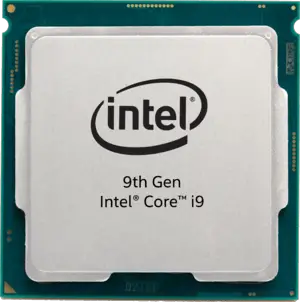 + + |
| manufacturer | Intel + |
| market segment | Desktop + |
| max cpu count | 1 + |
| max junction temperature | 373.15 K (100 °C, 212 °F, 671.67 °R) + |
| max memory | 65,536 MiB (67,108,864 KiB, 68,719,476,736 B, 64 GiB, 0.0625 TiB) + |
| max memory bandwidth | 39.74 GiB/s (40,693.76 MiB/s, 42.671 GB/s, 42,670.5 MB/s, 0.0388 TiB/s, 0.0427 TB/s) + |
| max memory channels | 2 + |
| max storage temperature | 398.15 K (125 °C, 257 °F, 716.67 °R) + |
| microarchitecture | Coffee Lake + |
| min junction temperature | 273.15 K (0 °C, 32 °F, 491.67 °R) + |
| min storage temperature | 248.15 K (-25 °C, -13 °F, 446.67 °R) + |
| model number | i9-9900KF + |
| name | Core i9-9900KF + |
| package | FCLGA-1151 + |
| part number | BX80684I99900KF + |
| platform | Coffee Lake + |
| process | 14 nm (0.014 μm, 1.4e-5 mm) + |
| series | i9-9000 + |
| smp max ways | 1 + |
| socket | LGA-1151 + |
| supported memory type | DDR4-2666 + |
| tdp | 95 W (95,000 mW, 0.127 hp, 0.095 kW) + |
| technology | CMOS + |
| thread count | 16 + |
| turbo frequency (2 cores) | 5,000 MHz (5 GHz, 5,000,000 kHz) + |
| word size | 64 bit (8 octets, 16 nibbles) + |
| x86/has memory protection extensions | true + |
| x86/has software guard extensions | true + |
